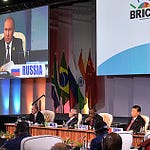A quick announcement: We’re holding a free live Sovereign Finance discussion on Sunday 22nd June, at 7.30PM on Zoom. We’ll discuss global trends, things you might do, and answer questions from the podcast so far. Register for free here.
Rob’s comments below are in italics.
Derek’s comments below are in normal font.
We thought we'd examine current events from a sovereign finance perspective today. So, what has been going on?
Well, it's important to have these conversations in a podcast like this, which started out with a fairly specific focus, namely, finance. The point is that finance is just one aspect of the entire human experience and human activity, and everything is interconnected.
One thing I've been reflecting on is that our tendency to carve views of life into separate, discrete domains and subject areas is actually quite destructive. It's destructive to our understanding because everything really impinges on everything else.
We're all polymaths, deep down.
I hope so. It's certainly what I aspire to be. We've touched on this many times, but I'm convinced we're living through a pivotal time in human history. It's certainly not the case that there is nothing new under the sun. There are intervals when it could well appear like that.
It's the scale and interconnectedness of everything, isn't it? What's happening probably has happened before. If you think back to the Magna Carta Declaration of 1215 and so forth, there have been repeat patterns, but not on the global connected scale that we have today.
Well, it's funny you should go back to that. I was about to go back with an example which doesn't go quite that far, but in the 16th century, as nearly everybody knows, Martin Luther nailed up a notice on his church doorway, which was the spark that ignited the Protestant Reformation. It was 95 articles.
Each of these articles was something where he felt that the Church of Rome had diverged from the teachings of Christ. I don't know what the other 94 were, but the number one one was the sale of indulgences. The Church had instigated this practice of raising money by selling indulgences, whereby you could buy your way to a shorter time in purgatory before you got to heaven, which is absolutely ridiculous. It's one of the most barefaced scams you can imagine. Obviously, nothing to do with the teachings of Jesus.
You can buy your way into heaven.
Yes, on multiple levels! Anyway, so the point is that that sparked the religious divisions, which created a lot of bloodshed and a lot of burnings at the stake over the next couple of hundred years. In some ways, it has been reverberating down to today. But I was thinking of this in the present context because this is an obvious example of somebody wanting to upset the prevailing control of the narrative. Of course, it came shortly after the invention of the printing press.
The big thing that Gutenberg did with the printing press—I don't know whether it was the very first one, but it was the prominent one—was print the Bible, which made the Bible itself available to many, many more people. Up to that point, it'd all been copied by hand. It was costly, immensely valuable, and only held by the clergy who...
And they were only in Latin.
They were only in Latin. There's a two-edged sword to the fact that intellectual life in the Middle and early modern ages was conducted in Latin. One was that it made it a closed book, so to speak, to the population at large. However, the positive side of it was that it enabled intellectuals of all disciplines to communicate with one another, regardless of their own native tongue. But, as you say, it was only in Latin.
They kept it that way for longer than they might have otherwise done to stop the proles from reading it.
Possibly, possibly.
Yeah, but anyway, the point is that both the proliferation of Bibles and the availability of printing, which enabled other people's ideas to reach a far wider audience than before, unleashed a lot of discontent amongst the population at large against the elites.
It's interesting. I was reflecting the other day that I remember at school in the hymn book we had this hymn, All Things Bright and Beautiful, very twinkly, twee hymn tune. We were sometimes instructed to omit some verses when we sang the hymns.
Yeah, all things great and small.
So obviously, being the curious type I was, I read the verses we were not to sing. I can still remember to this day that the verse we were instructed not to sing was the one that goes, “The rich man in his castle. The poor man at his gate, God gave them their endowments and ordered their estate,” which is pretty much the narrative of the ruling classes. To a large extent, people bought it until they had some insight that, you know, perhaps there's another way of looking at things.
As we go down the ages, you see the same process happening, those at the top of the hierarchy control the dialogue, the narrative, the story, the context in which people accept as the way things are. Each time a new technology appears that disrupts their monopoly on that narrative, there's a scramble to recontain it. So that happened with printing. The governments required that all printing presses be licensed and that any pamphlet should indicate who printed it so that government goons could come round and harass it.
Presumably for your “online safety”!
Well, exactly. You know how this went down with newspapers, radio, TV, and then the internet, and they were slightly blindsided by the internet. There's a lot of pushback, yes, we need to ensure our online safety.
But you know, it seems to be whack-a-mole, and as fast as they cover up one outlet, another one appears. This is what has been going on now.
So, do you think that is different this time around compared to previous technologies?
Well, I'm watching this space. I’d love to believe in reincarnation because I don't think I will last long enough to see this through to the end unless it's...
Lots of people do, so, you know, to keep an open mind, I guess!
I'd love to be a historian in the early next century and look back on this time. But we at least have a front row seat to view it in real time. You know, just like in the time of the Reformation or the Industrial Revolution or anything else that people were living through when there was a sudden acceleration of the rate of change, it's pretty difficult to take stock of it. But that's what I wanted to talk about today.
The hold on the prevailing narrative is a good metaphor: it's like a dam. If you imagine a dam that has a huge reservoir of water behind it and has been there for a while, it's not been very well maintained or anything, and occasionally, little cracks appear.
Sounds like the Berlin Wall.
Yes, exactly. Then you have a bit more of a crack somewhere else and a bit more of a crack somewhere else, and sooner or later, the whole structure is so much weakened that it just collapses. It seems to me that several strands in the official narrative are now under such scrutiny that many people are having their faith challenged by things they've taken for granted. As soon as you get one of them challenged, you start looking at some of the others.
I'll come back to the question of Trump and where he's at and what he represents, but certainly his arrival as president of the United States for the second time has accelerated this process and some of it by initiatives that he's taken.
I've heard him described as the wrecking ball of the elites.
Yeah.
It's difficult to know where to start, but I wanted to just look at a couple of things that, personally, I regard as very positive from initiatives that appear to stem from him. One of them was the appointment of Robert Kennedy Jr. as the head of the Health and Human Services Department.
The other one was the lifting of the curtain on discussion of various topics with the department chaired by Anna Paulina Luna, who is initially looking into the John F. Kennedy assassination in 1963. These are two pivotal things and...
The fallout from that event is still going on.
Well, in a way, it explains the impotence of every president since Kennedy.
Yeah, we've got a hollowed-out state where I don't think the presidents actually make their decisions. That probably extends to Trump. Perhaps Kennedy was the last one, and he got bumped off for challenging the status quo.
Yeah, well, he got bumped off for several reasons. One is that he essentially declared open conflict with the CIA. One is that he refused to give United States air support to the Bay of Pigs invasion of Cuba. One is that he and his brother Robert, as attorney general, were prepared to take on the mafia and organised crime.
Another one was that he was gearing up to end the Vietnam War. So he'd antagonise organised crime, the CIA, and probably all the other secretive or semi-secretive intelligence operations. He'd antagonise the arms manufacturers and the military.
Of course, after the Cuban Missile Crisis, Kennedy and Khrushchev were so traumatised by the realisation that they had brought the entire planet to the brink of destruction that they communicated with each other. They wanted to back off and negotiate a way out of this.
So, it's very interesting. I was watching a clip today of the hearings of the Senate Oversight Committee on the Kennedy assassination. The witness was one of the doctors in the emergency room when Kennedy was brought in.
His testimony is just breathtaking. Presumably, he was no more than an intern at that time. I don't know how many of the other people in that emergency room are still alive today. But they brought Kennedy in, lying on his back on a gurney and they were trying to resuscitate him and they were trying to ventilate him and it wasn't working so they decided to do a tracheostomy and one of the things that came out of that is that the bullet hole in his neck was plainly an entry wound not an exit wound.
In other words, it had been fired from in front of him and not behind him. After they'd been trying to, they'd done the tracheostomy, they were trying to get the blood circulating, they were trying to get him ventilated. One of the other doctors said, basically, then lifted him up and saw the fact that the left half of his skull had been blown off and announced that there was actually no point in attempting a resuscitation. That's something which has never been publicly acknowledged until now, completely demolishing the prevailing narrative. So several things arise from this. One is: How much can you trust your government?
How much can you trust the agencies of your government? How much do you believe they are doing what they're saying they're doing and not doing what they're not saying?
That will be the beginning of the collapse in acquiescence to the official narrative for many people. I'll just refer to the Make America Healthy report, which was published yesterday. That's 68 pages long. I haven't read it in detail. I have read the summary. There's a very good summary by Robert Malone. It'd be interesting to see what alternative perspectives people have on it. But it's very measured and science-based. It's very much saying that we have an inexplicable chronic health crisis, particularly amongst our children.
We need to get some explanations for this. They lay out the various areas that need to be looked into, one of which is obviously food and nourishment, one is lifestyles, one is environmental pollution, and one is vaccinations.
You know, the fact that all of those are coming under scrutiny, that in itself is going to be a gateway to questioning authority, questioning received vision for a whole lot of people, especially those who have tragically had children who've been compromised or worse.
Yeah, I can tell you that as a parent of fairly small children, the childhood vaccination schedule is a wild rabbit hole to fall into.
Yeah, exactly so.
But you know, the point is that nothing should be off the table for questioning. If you can't question it, it's not science.
That is the big point. Meanwhile, we've got a whole bunch of other things going on in the world, which, one way or another, are going to impinge on our prosperity and finances. So this is not a wild digression from the topic of this podcast.
We've got the Russian-Ukraine conflict, the India-Pakistan conflict, the Israel and Middle East conflict, and all of these have the potential to spiral wildly out of control. I don't listen to mainstream news very much, but I catch up on the radio for BBC lunchtime news two, three, or four times a week. I'm astonished by that almost every single time I tune into it, none of those things are amongst the headlines. There are regular developments on all of those which are potentially catastrophic.
Well, it just shows it's a thinly veiled propaganda outlet and not a news service.
I don't know whether you know, but over the last day or two, the Ukrainians launched 495 drones. The Ukrainians launched an attack on Moscow, which was shot down. 63 of them reached the Moscow area. I don't know whether any of them proceeded to their targets or not. From the reports I've seen so far, it's not clear. But for one thing, this strikes me as completely and utterly reckless.
It's very dangerous, isn't it?
It also strikes me that Russia is being incredibly restrained in its responses. There seems to be a lot more intelligence being displayed on the Russian side than on the Western one. You know, we've had the on-again, off-again peace initiatives that Trump has intermittently attempted to promote. None of them seems to get anywhere. The Russians have repeated the same statement of their position that they have been stating since at least 2019, if not 2014. They're plainly not going to budge from that.
The peace talks feels a bit like filibustering.
Yeah. So, meanwhile, on the economic front, which again gets closer to the real focus of this podcast, it seems that the rest of the world is steadily gearing itself up to being able to act independently of the American-led financial and economic system. There's very little work the rest of us can do about it. We've got our own leaders apparently having taken leave of their senses.
The idea that Britain or France or Germany can actually come out in conflict with Russia seems unrealistic, it seems reckless and on the wrong side of history. You know, it looks like we're backing the losers, and we're doing it without any resources of our own, which are up to the task. We haven't got a military of this scale that could make any meaningful contribution. I don't think we can produce arms. The other thing, which of course is mystifying in this sense, is that apparently the United States is still sending weapons and ammunition and military hardware to Ukraine. Again, there's a bit of uncertainty about whether that is happening or whether it's been stopped or how much longer it can go on, but if they wanted to stop the conflict, that would be the first thing to do.
Yeah, this is what Caitlin Johnson says, isn't it? Don't look at what they say, look at the movements of troops and warfare equipment around the globe. If you keep an eye on that, that tells you what's really going on.
Three of the people I look to for an intelligent commentary on geopolitics are Colonel Douglas McGregor, Scott Ritter and Daniel Davies, a retired Lieutenant Colonel. They've got brilliant podcasts. They're on YouTube a lot and seem very clear, intelligent, well-informed, and worth listening to. Not necessarily, you know, to believe them hands down flat out, but to certainly take into an attempt to provide some overall assessment with whatever other sources of information you want to bring into it. But, interestingly, Scott Ritter says that back in January, he had tentative hopes that Trump would make a significant difference to the approach.
He's now become deeply disappointed, which is pretty much what I thought. You know, quite a lot. I noticed that many people whose perceptiveness I would respect seemed to have a lot of faith in Trump in the run-up to last November's election. I wondered how this would hold up, and it's already holding up very poorly.
Yeah, all of the voices that were sceptical about him, I'm thinking of Whitney Webb, I'm thinking of Caitlin Johnson. They were pretty much on the money.
Yeah. I watched carefully in the early days of his presidency, thinking perhaps he's not as stupid as he looks. I've come round to the view that he probably is. Apart from being a ridiculously needy, egotistical narcissist. He's not very well educated. He certainly isn't a sophisticated thinker. He doesn't seem to hold any consistency from one moment to the next.
Who's pulling the strings then? Because that's always the big question I get asked. Who are “they”?
Well, who knows? Partly, it's his advisors around him. In the run-up to the election, he either chose or was nudged to choose a whole variety of people who would not be, shall we say, very sympathetic to his ostensible agenda. The other thing is that nothing that's happened so far has diminished the power of what you might broadly call the deep state, by which I would mean an alliance between the intelligence services, the banking industry, the arms industry, the military and corporations.
They seem to be still pulling the strings. But in the meantime, scepticism amongst the wider public is growing. I would imagine that we must reach a tipping point at some point.
Yeah, this seemed pretty obvious to me going into the election cycle last year; it seemed obvious that voting is the plastic steering wheel that Maggie Simpson has in The Simpsons. I was surprised how seriously everyone took it. Like, how many times do we have to go through this?
Indeed. Okay, well that's where we are for this week.
A Quick Announcement: Join us on Zoom on Sunday 22nd June For a Free Discussion
A quick announcement that Derek and I are going to have a live Sovereign Finance discussion on Sunday, June 22nd, at 7.30 PM on Zoom. Registration is here. Do we have a topic in mind for that, Derek?
Basically this is an opportunity for anybody to raise any comments or questions they have regarding any of the things that we've discussed, either on this podcast or any of the previous ones or any thoughts that you might have or any questions you might have about the whole way that the financial system works and what's available to you to optimise your own path through the rest of your life.
Yeah, what plan do you need to make? That's the big question, isn't it? So yeah, we'll publish details with this episode and with the Substack emails that go out. But hopefully, we'll see as many people as possible there. All right, thanks.
Okay, great. If you haven't already registered to be a member of this podcast, I urge you to do so so that you don't miss any announcements about what we're doing.














Share this post